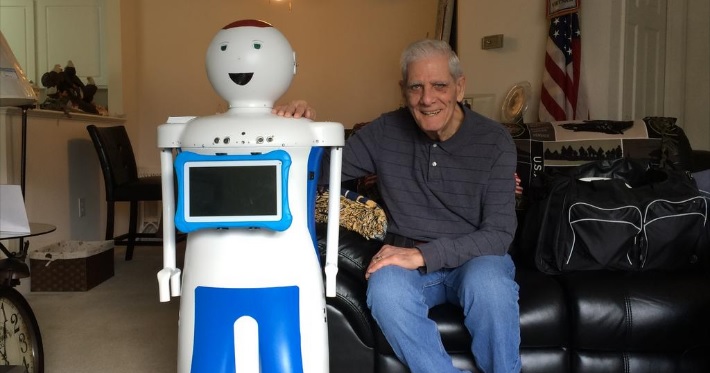JUDY WOODRUFF: A Northern Virginia startup company is using new technology, and a sense of humor, to care for the elderly.
The "NewsHour"'s Teresa Carey went to Fairfax, Virginia, to meet RUDY the robot.
TERESA CAREY: Olga Robertson has lived in her house for 57 years.
With a large Italian family, including two daughters and grandkids, Robertson's home has a lot of memories.
OLGA ROBERTSON, Virginia: I'm here by myself most of the time, but I feel comfortable here.
That's why I don't want to go into a home or anything.
TERESA CAREY: But despite being a spry 88-year-old, Robertson has an in-home caregiver who visits every day.
OLGA ROBERTSON: She helps me do a lot of things.
She will take me places, like to my doctor's appointments.
She even does word puzzles with me.
TERESA CAREY: In March, to supplement her home care assistant, Robertson was given the opportunity to try RUDY, a robot designed by Anthony Nunez, CEO and founder of INF Robotics, a Northern Virginia start-up.
Nunez hopes RUDY will help prolong seniors' independence.
He built in features where caregivers, emergency responders, or family can check in remotely through a Skype-like interface, hello, there you are. Hi, and steer RUDY through the home in search for the senior.
And, as with any technology, there is a learning curve.
Nunez created RUDY because of what he witnessed growing up.
ANTHONY NUNEZ, CEO, INF Robotics: My grandmother fell down when she lived alone up in Rhode Island and ended up losing her independence.
She ended up moving into my home.
And, as a teenager, I watched my mom take care of her.
And I kind of saw both sides of it at an early age.
I wanted to do something about it, because I know that situation is not uncommon.
TERESA CAREY: But Nunez and his creation RUDY have a sense of humor.
RUDY can tell jokes.
ROBOT VOICE: My first job was looking at an orange juice factory, but I got canned.
TERESA CAREY: Play games, and even dance the Jitterbug.
But for Robertson, the best feature is companionship.
OLGA ROBERTSON: You can talk to him all day, and he responds to you.
It was good to have somebody to have a conversation with.
Let's put it that way.

TERESA CAREY: A Brigham Young University study showed that when it comes to the impact on lifespan, loneliness is equal to smoking 15 cigarettes a day.
Other robots, such as PARO robot pets, or ElliQ, are similar to RUDY, providing companionship or relaying information between seniors and their caregivers.
Cliff Glier, CEO of SenCura, a non-medical home care agency, is one of the early adopters of RUDY.
CLIFF GLIER, CEO, SenCura: Older adults that live alone, having a robot overnight is less expensive than having a real caregiver stay awake and sit by their bedside.
TERESA CAREY: At $100 per day, Glier offers RUDY in conjunction with his home care services, using RUDY to check in on seniors through video chat.
CLIFF GLIER: We here at the office will check in to the home up to three times a day, and more if need, check in to make sure everything is OK.
Have you taken your medications?
Have you gotten up and walked around?
ROBOT VOICE: Oh, you look nice today.
OLGA ROBERTSON: Do I? Thanks.
CLIFF GLIER: We're checking in without having to drive over and send a caregiver in to ask those basic questions.
TERESA CAREY: Some evidence suggests that nothing replaces the human touch, but because recent generations are having fewer children, there could be a shortage of people who will be available to care for the growing senior population.
With four prototypes in use in the Washington, D.C. area, and more on back order in New York, San Diego and Boston, RUDY is an example of how robots could become a part of caring for seniors. For the "PBS NewsHour," I'm Teresa Carey in Fairfax, Virginia.












